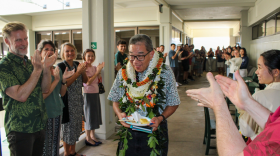The state probate court is in the final stages of selecting a new trustee to oversee the $15.1 billion Kamehameha Schools trust established by Princess Bernice Pauahi Bishop.
Dr. Noelani Goodyear-Kaʻōpua is the most recent addition to the trustee board. She grew up down the road from Kamehameha Schools' Kapālama Campus in her "popo's," or grandma's, house at the corner of Leilani and School Streets in Kalihi.
"I actually remember the first day that we were driving up to campus for the admissions exam that I took when I was 4 years old, and I remember thinking this place is massive," Goodyear-Kaʻōpua said.
She said she feels lucky to be a KS "lifer" entering kindergarten in 1979 and graduating in 1992, but she never thought she'd become a trustee.
The selection process has historically been influenced by those loyal to the state Democratic Party with little transparency or community input.
"I definitely did feel shocked that I was selected for this position," Goodyear-Kaʻōpua continued. "When I was a student, I remember one of my high school teachers saying, 'Someday you need to come back and be a trustee' and me telling him, 'There is no way someone like me would ever be selected as a trustee.'"
But times are changing, and Goodyear-Kaʻōpua sees her 2022 selection as KS trustee as a result of that change.
"At every level of the institution now there are people who believe wholeheartedly that Hawaiian cultural-based education, Hawaiian language, our ‘ike kupuna is incredibly valuable and that should be at the center of what we do at Kamehameha," Goodyear-Kaʻōpua said.
This has not always been the case, she said. Upon opening in 1887, the trust and school were run exclusively by white men.
"Men who were deeply connected to the sugar business elites involved with overthrowing her hānai sister, Queen Liliʻuokalani. They had a particular vision for Hawaiʻi in which Hawaiians were the ones to make the system go but not necessarily to lead it," she said.
"It's not at all a stretch to say that Kamehameha was an assimilationist institution for a majority of its history."
Instead of focusing on college prep and culture-based education like the school does now, KS focused on manual labor and military training. It wasn't until the movements of the 1970s, said Goodyear-Kaʻōpua, that KS began to shake its assimilationist approach to education.
"I think the direction we see Kamehameha going in today is directly connected to the movements of our peoples over the last 50 years, to reclaim our language, and our culture, and to say that these aspects of who we are have so much value for us today. In many ways, they are what gives us our edge," Goodyear-Kaʻōpua said.





